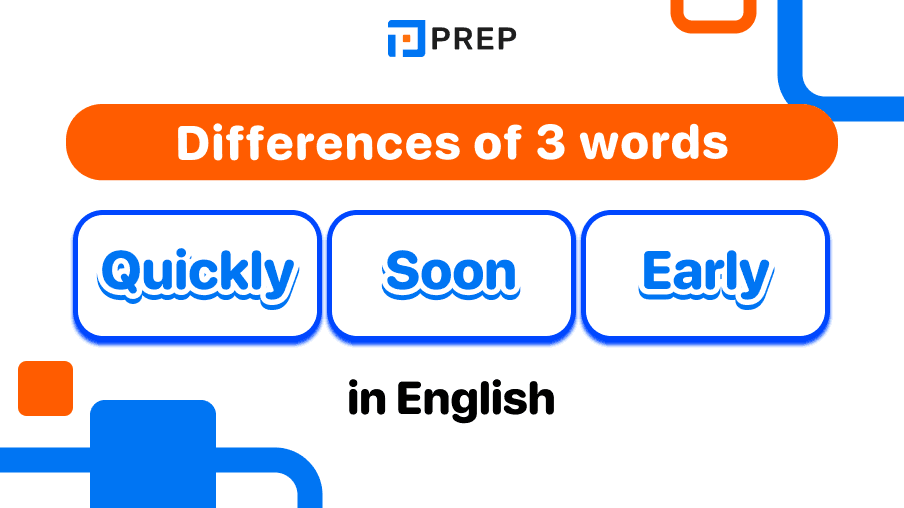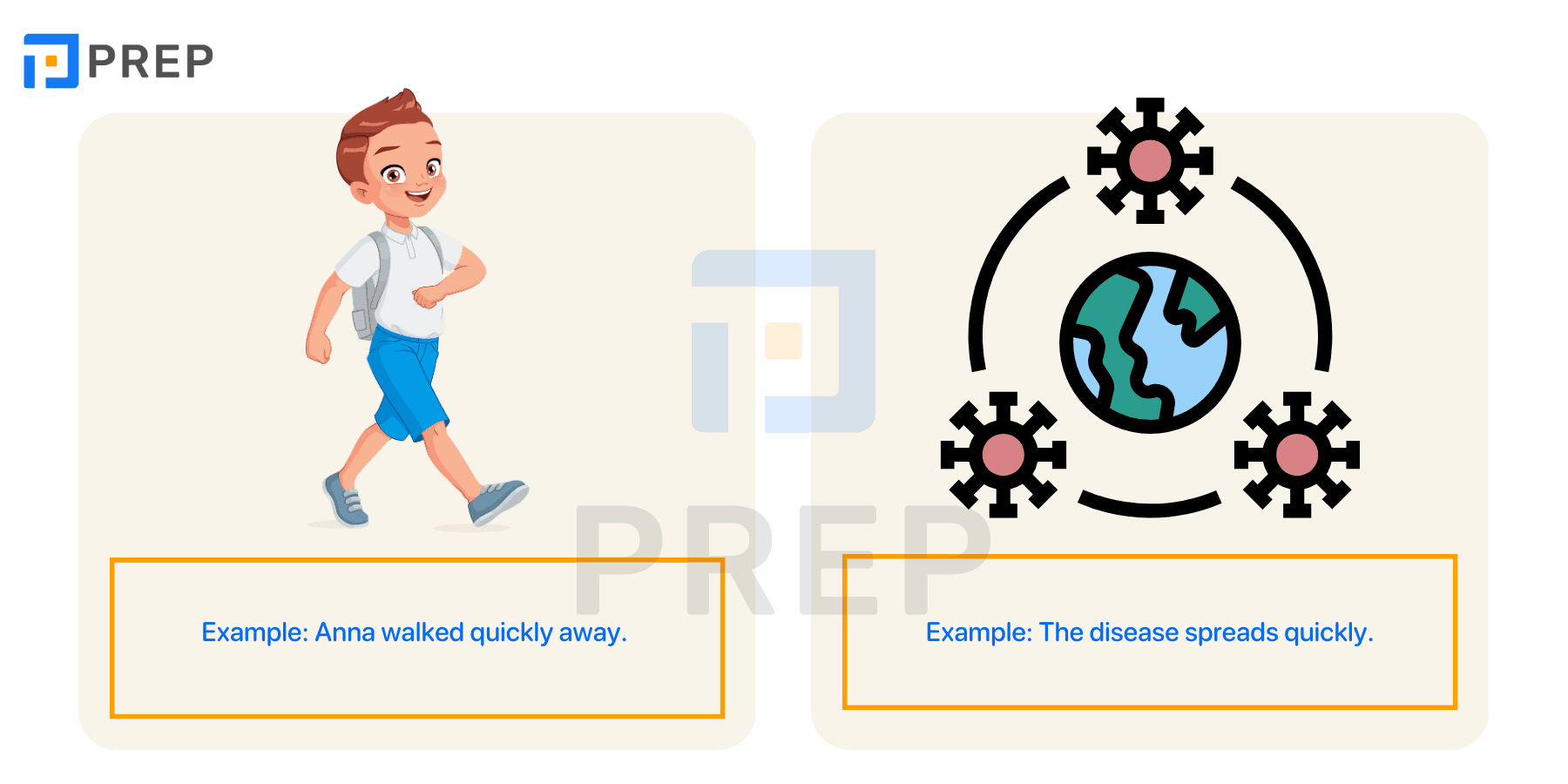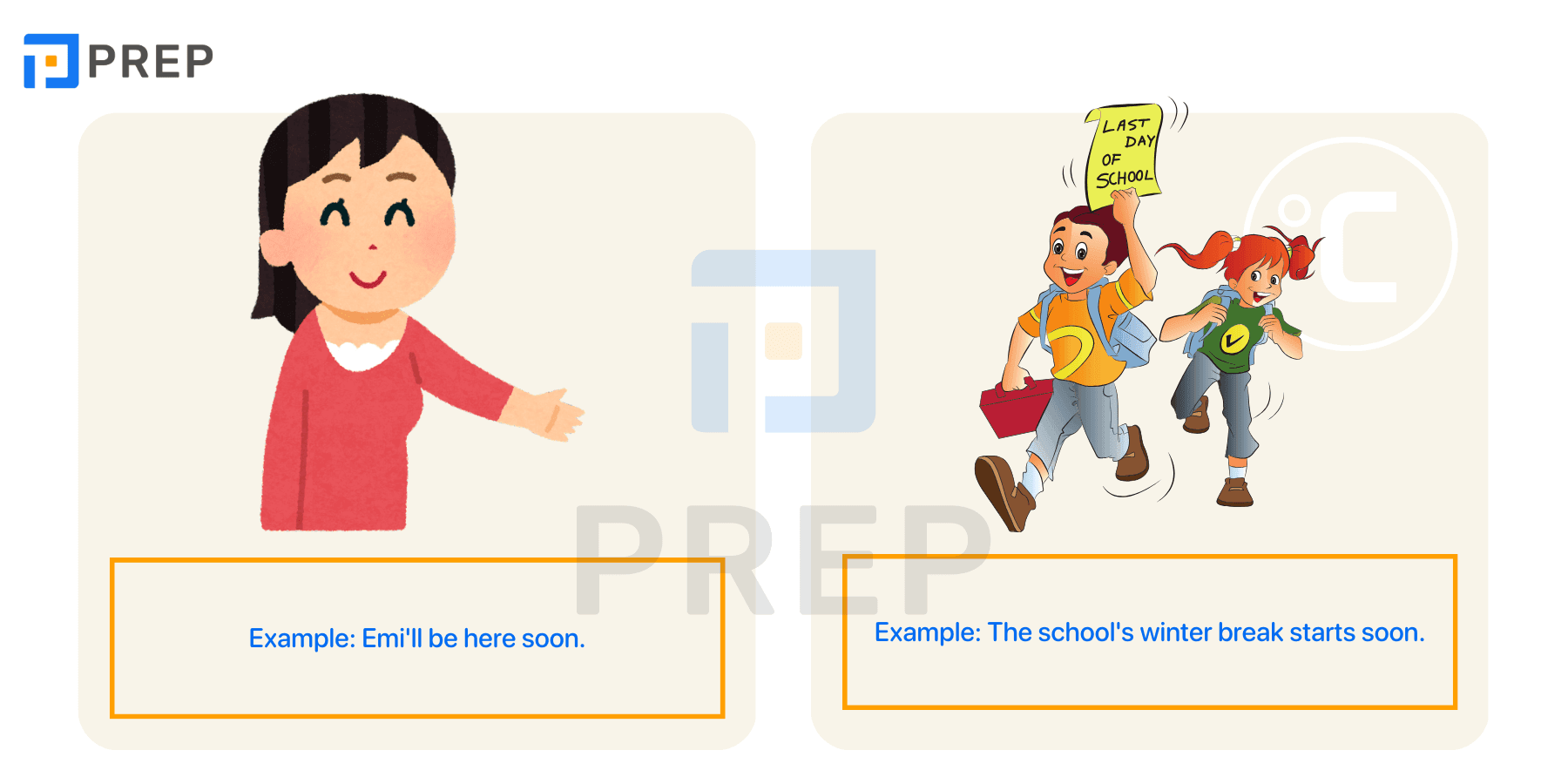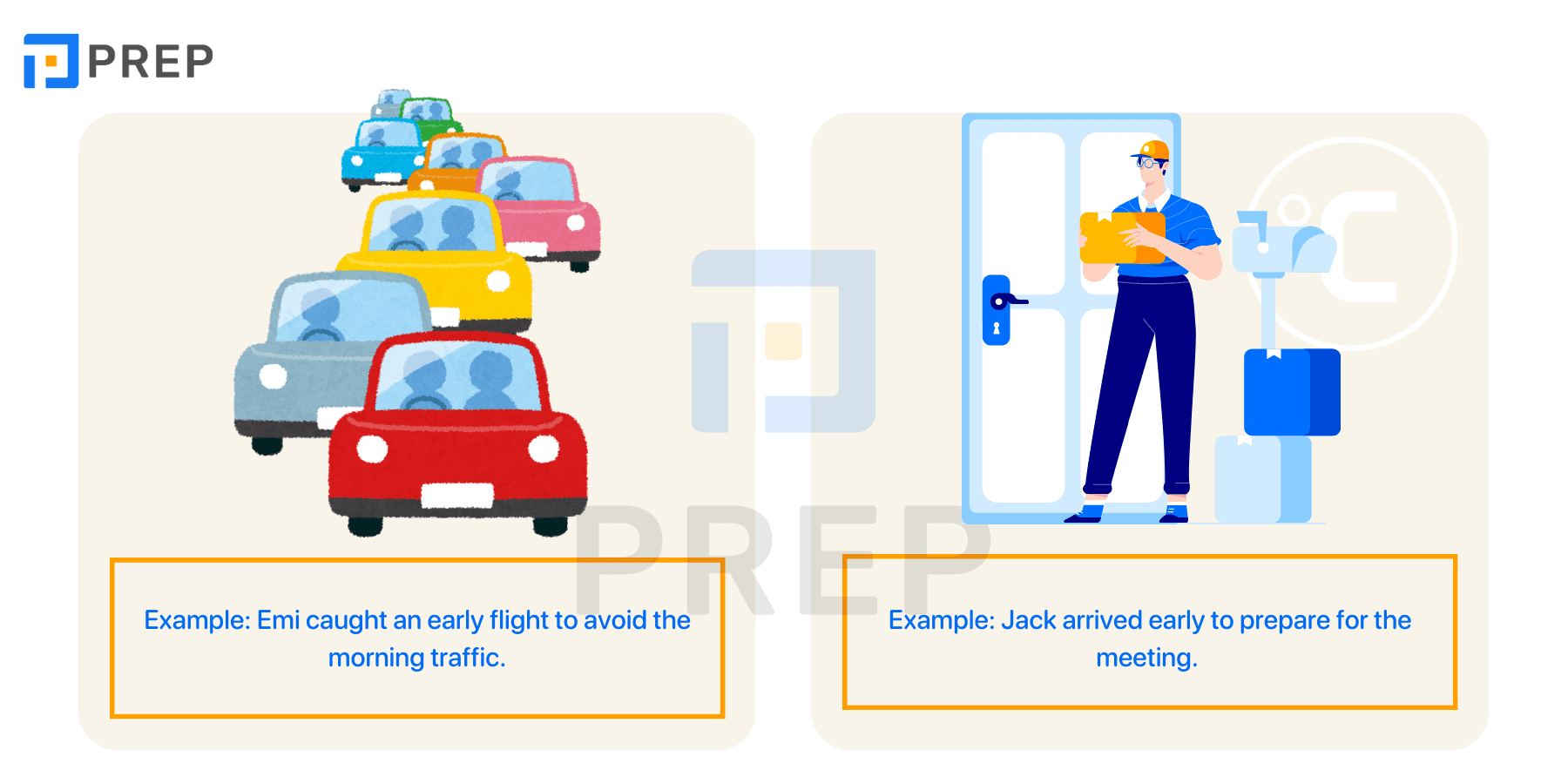What are Quickly, Early and Soon? Distinguishing Quickly, Early and Soon
Quickly, Early and Soon are three common adverbs in English. In the article below, PREP will share detailed concepts, usage, and the differences between Quickly, Early and Soon. Let’s take a look!

I. What is Quickly?
Before comparing the differences between Quickly, Early and Soon, let’s explore the concept, idioms, and phrases with Quickly!
1. Definition
Quickly is pronounced /kwɪk/ and functions as an adverb, meaning: at a fast speed; after only a very short time. For example:
-
Anna walked quickly away.
-
The disease spreads quickly.

What is Quickly?
2. Words/phrases associated with Quickly
|
Words/phrases associated with Quickly |
Example |
|
quickly and easily |
Emi finished the task quickly and easily. |
|
go quickly |
Go quickly, or you’ll miss the bus. |
|
act/respond quickly |
The manager acted quickly to resolve the issue. |
|
move quickly |
The deer moved quickly through the forest to escape the predator. |
|
quickly realize |
Jack quickly realized that he had made a mistake. |
|
quickly learn |
Susan quickly learned how to use the new software. |
|
quickly find |
John quickly found the lost wallet under the table. |
|
quickly followed by |
That was followed quickly by a second, third and fourth round of cuts. |
|
quickly establish |
The company quickly established itself as a leader in the industry. |
|
quickly change |
The weather can quickly change in the mountains. |
II. What is Soon?
To accurately distinguish between Quickly, Early and Soon, let’s dive into the information about Soon below!
1. Definition
"Soon" is pronounced /suːn/ and functions as an adverb, meaning: in or within a short time; before long; quickly. For example:
-
Emi'll be here soon.
-
The school's winter break starts soon.

2. Idioms with Soon
|
Idioms with Soon |
Meaning |
Example |
|
no sooner ... than |
used to show that one thing happens immediately after another thing |
No sooner had I sat down than the phone rang. |
|
no sooner said than done |
used to say that you will do something immediately |
When she asked him to fix the problem, it was no sooner said than done. |
|
see you soon |
used for saying goodbye to someone you are going to meet again soon |
I’ll see you soon. |
|
sooner or later |
used to say that you do not know exactly when something will happen, but you are certain that it will happen |
Sooner or later, you will have to make a decision. |
|
would (just) as soon |
If you would (just) as soon do something or would sooner do something, you would prefer to do it rather than something else that is possible |
I would just as soon stay home as go out tonight. |
3. Words/phrases associated with Soon
|
Words/phrases associated with Soon |
Example |
|
soon after |
John graduated from college and soon after started his first job. |
|
how soon |
How soon can you finish the project? |
|
the sooner the better |
Please send me the report; the sooner the better. |
|
as soon as |
I’ll call you as soon as I arrive. |
III. What is Early?
To understand the differences between Quickly, Early and Soon, let’s explore the concept of Early and its idioms!
1. Definition
"Early" is pronounced /ˈɝː.li/ and functions as both an adjective and an adverb, meaning: near the beginning of a period of time, or before the usual, expected, or planned time. For example:
-
Early acts as an adjective. For example: Emi caught an early flight to avoid the morning traffic.
-
Early acts as an adverb. For example: Jack arrived early to prepare for the meeting.

2. Idioms with Early
|
Idioms with Early |
Meaning |
Example |
|
an early bath |
used to refer to a situation in which a football player is ordered to leave the pitch during a game because they have done something wrong |
The defender got an early bath after receiving a red card in the first half. |
|
early to bed and early to rise (makes a man healthy, wealthy, and wise) |
said to emphasize that someone who gets enough sleep and starts work early in the day will have a successful life |
My grandmother always says, “early to bed and early to rise makes a man healthy, wealthy, and wise”, and she lives by that rule. |
|
it's early days |
said when you think it is too soon to make a judgment about the likely result of something because a lot might still happen or change |
The project seems promising, but it's early days yet. |
|
drive/ send someone to an early grave |
to cause someone to die young |
The constant stress of his job was driving him to an early grave. |
3. Words/phrases associated with Early
|
Words/phrases associated with Early |
Example |
|
early night |
I'm exhausted; I think I'll have an early night tonight. |
|
early age |
She showed a talent for music from an early age. |
|
early days/ years |
It's still early days in the project, so there’s much to be done. |
|
at the earliest |
The package will arrive on Monday at the earliest. |
|
at your earliest convenience |
Please send me the report at your earliest convenience. |
IV. Distinguishing Quickly, Early and Soon
Let’s distinguish Quickly, Early and Soon with PREP below!
|
Quickly |
Soon |
Early |
|
|
Meaning |
Refers to the speed or promptness of performing an action without taking much time. |
Refers to something that will happen in the near future, but not immediately. |
Refers to a time that is sooner than expected or earlier than a usual timeframe. |
|
Example |
Anna quickly finished her homework. |
I’ll see you soon. |
Emi arrived early for the meeting. |
V. Exercises to Distinguish Quickly, Early and Soon
To better understand the usage and differences between Quickly, Early and Soon, let’s complete the exercises below with PREP!
1. Exercise: Choose the appropriate word (Quickly, Soon or Early) to fill in the blanks in the following sentences:
-
The train arrived _______ at the station, surprising everyone.
-
She completed the assignment very _______ because she had another project to work on.
-
We will be leaving _______ after lunch, so be prepared.
-
He woke up _______ to prepare for his morning jog.
-
Please respond to my email as _______ as possible.
-
The concert tickets sold out _______ after they were released.
-
They plan to arrive at the airport _______ to avoid the rush.
-
I’ll call you back _______ after the meeting ends.
-
The meeting was scheduled for 9 AM, but he arrived _______ at 8:30 AM.
-
We need to finish this project _______ if we want to meet the deadline.
2. Answer
|
|
Above, PREP has shared the concepts, usage, and differences between Quickly, Early and Soon. Keep following PREP for more useful and interesting English knowledge!

Hi I'm Chloe, and I am currently serving as an Product Content Administrator at Prep Education. With over five years of experience in independent online IELTS study and exam preparation, I am confident in my ability to support learners in achieving their highest possible scores.
Comment
Premium content
View allPersonalized roadmap
Most read












